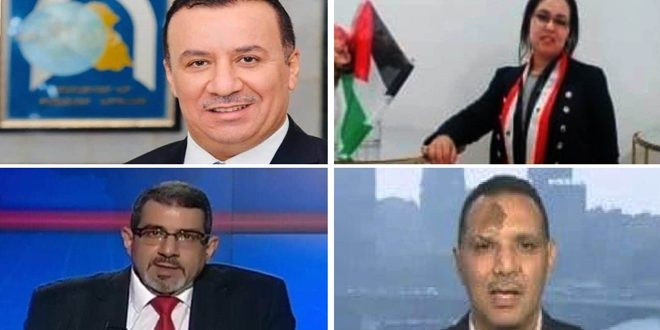The voices of Arab thinkers are being raised to emphasize the importance of preserving Arabism as a civilized concept and confronting the cultural and intellectual invasion and the attempts of imperialist and Zionist forces to undermine and distort Arabism in the mindset of the Arab community as it is a collective ideology and the most threatening factor to the colonial interests in the region.
From Iraq, academic researcher Dr. Ahmed Al-Jubouri noted that the Arab identity has acquired its permanence and continuity from its relationship with Islam, the Arabic language and the land that mediates the ancient world. He indicated that the future awaiting this nation is greatly influenced by the civilization content it owns.
Arabism as an identity has been affected by a number of events throughout history. Among these events as mentioned by the Iraqi academic researcher is colonialism in the early years of the last century and the Arab-Israeli conflict. The most prominent challenges facing the Arabs today as a nation is the crime of normalization with the Israeli enemy. The plots that targeted the Arab peoples to deplete their capabilities and the destruction of its infrastructure had the most significant impact on slowing down development projects in the history of the Arab nation.
The Iraqi academic researcher affirmed that Syria has played an active and decisive role in defending Arab identity and the concept of Arabism throughout the ages. It adopted and supported the Arabization project. In Syria medical education began in 1919, the founding professors at the time insisted that the Arabic language be the language of education in it, despite the insistence of the French occupation that French be the language of public and university education in Syria.
On the concept of Arabism in the mindset of the Arab people, the Palestinian Arab thinker and researcher Ibrahim Alloush considered that Arab nationalism and the concept of Arabism in our homeland are not at their best. He pointed out that the enemies of the Arab nation were able to access some people in our Arab homeland who suffer from fragility of national affiliation with the aim of sabotaging and destroying Arab countries from within- this is what was evident in the so-called “Arab Spring”.
Alloush said that the enemy is trying hard to portray Arabism in many minds as “terrorism, takfir, and the official Arab regime that is negligent and dependent on the West.”
Alloush highlighted the role of Syria in defending Arabism and the Arabs despite its difficult conditions, war, siege and terrorism.
Muhammad al-Sayed Ahmed, a political researcher from Egypt, said that “the Arab countries have been subjected to a brutal foreign war for a long time in an attempt to dismantle, fragment and divide it through an attempt to obliterate the Arab cultural identity that has historically been entrenched over hundreds of years”, noting that the Western colonial scheme is working to eliminate the concept of Arabism which has become confused in the minds of many.
Mr. Ahmed emphasized that Syria is still preserving itsArab identity and defending the resistant Arab national project which pushed the global imperialist powers and the Zionist enemy to launch this global war against it.
From Tunisia, the activist and political thinker Intisar Annabi underscored that Arabism is not as promoted by its enemies as it is far from racist. Arab historians and writers emphasized in their writings that race was not one of the conditions for belonging to the Arab nation and that nationalism factors such as language, culture and geography share a common destiny.
Annabi believes that the enemy’s plans wanted to confuse the concept of Arabism in the minds of the Arab people and the youth in particular with the aim of dispersing and destabilizing identity and belonging, and “passing a suspicious democracy and Western freedom to target the unity of the Arab ranks and consciousness”. The enemies of the Arabs imposed malicious agendas in every Arab country, starting from appointing their agents at the head of official regimes, to waging direct and indirect wars against the protectors of Arabism, and what Syria is exposed to is the best proof of that.
The concept of Arabism remains a single blazing language and a social and cultural affiliation that transcends borders and which is still alive and deeply rooted in the heart of Syria.
Inas Abdulkareem

